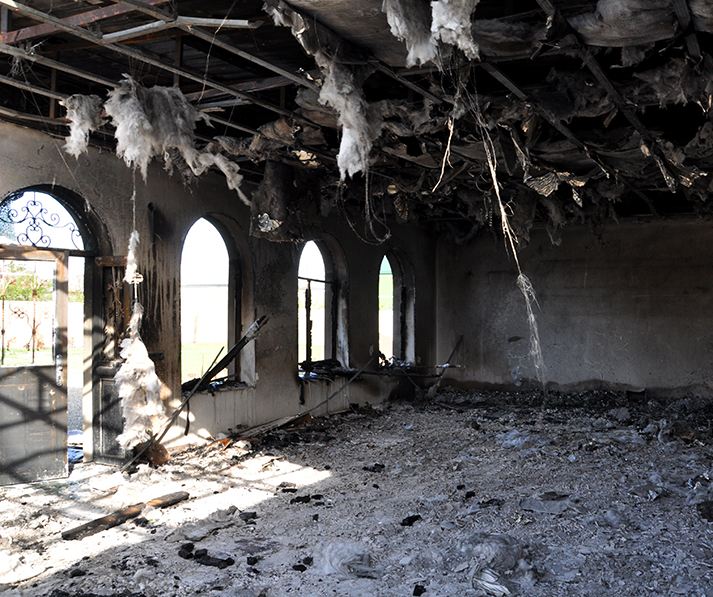
The newly built prayer house in Mughanlo which was burnt on April 18. (DF Watch.)
TBILISI, DFWatch–In a Muslim village near Tbilisi, a man was recently stabbed to death, and three days later a prayer house was put on fire. Is there a connection? DF Watch went there to investigate.
The village is called Mughanlo and lies about 30 minutes’ drive east of the capital, toward the border with Azerbaijan, and is populated mainly by Azerbaijanians.
Exactly what happened and why is unclear, and the story we were told differs from what was reported by a local news outlet.
What is clear, is that that a 40 year old man had died outside the prayer house a few days before it was set on fire.
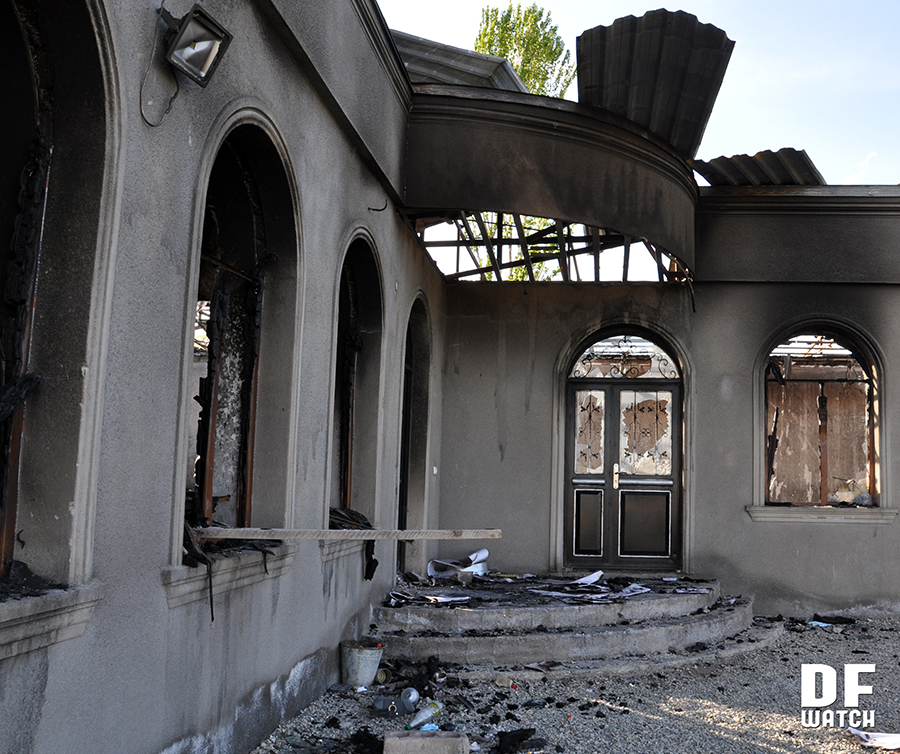
(DF Watch.)
The murder took place on April 15, after a wedding at which the murder victim, Oruj Amirastanov, had been best man for the groom Elizbar Aljaliev.
A conflict developed between some of the men at the wedding, which was held close to the prayer house. Tens of men went outside and some of them walked into the yard in front of the prayer house.
During the conflict, Amirastanov was stabbed with a knife and died.
Pirveli Radio reported that the 40-year old had hid in the prayer house before he died.
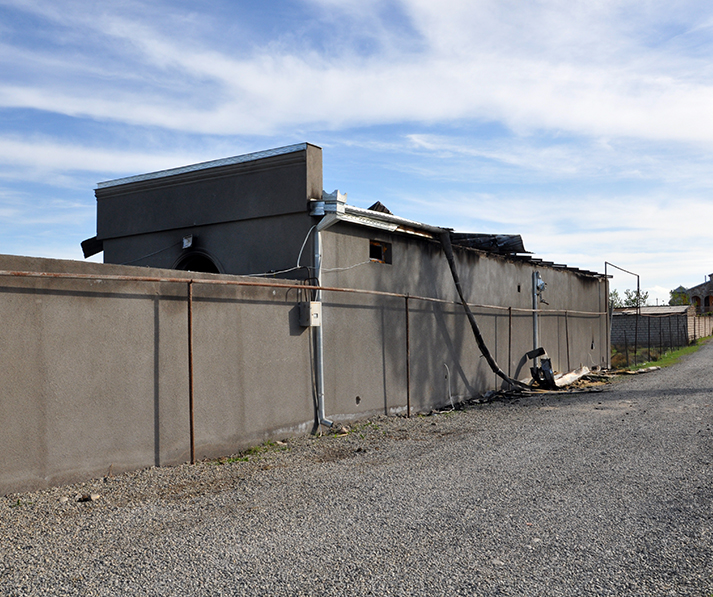
(DF Watch.)
Three days later, on April 18, the house was set on fire. Was there any connection between the murder and the fire?
DF Watch found that some locals think so; they say the murder has connection with a religious conflict that has been developing among the Muslim population in the village for the last year.
The prayer house that burnt was newly built by a group of Muslims who broke away from the mosque already there.
Everyone, including elderly people, youth and children, used to go to the old mosque for prayer. Old people, who also were responsible for the rules in the mosque, adhered to a religious practice called self-flagellation which has been customary in this area a long time, but the younger Muslims, who had started to study Islam, discovered that such rituals are not described in the Quran. The youth opposed the older Muslims and were kicked out from the mosque.
About twenty young people were left without a place to pray, one of them told us. The man, who did not wish to say his name, told us that they began gathering at the private house of one of the villagers to pray and did that for about a year.
The older Muslims who were using the mosque didn’t like that the youth were practicing their belief differently from them and attempted to teach them how to pray. This caused a conflict within the Muslim community in Mughanlo, where all Muslims are Shia.
Part of the Muslims decided to construct another mosque in a village so that the youth who were thrown out from the mosque had place to pray. There was a plan to construct a large mosque, which would need much time, so they decided to first build a temporary locale of 160 square meters. This was the building that was burned down on April 18, three days after the murder.
Some locals believe that it was set on fire by relatives of the dead man for reasons of revenge; others say this was just an excuse, as the conflict started when the youth were thrown out of the mosque and those from the mosque didn’t like that they had a new place to go and pray. They wanted to destroy the prayer place and used the murder as an excuse for doing that.
The day DF Watch visited Mughanlo, on Thursday, it was windy and the village was almost empty, but we managed to speak with one of the young Muslims who was using the prayer house that burned. We also spoke with Shami I Khadirov, one of the investors for the new place of prayer and also owner of the house where the wedding took place.
Khadirov says that part of the Muslims had started using this new prayer place, which he and several others constructed, in November, 2013. It is not a mosque, but it is in a garden where a new large mosque will be constructed. Like almost every mosque in Georgia it was also registered as a private house, because Georgian legislation didn’t have rules for registering places of prayer for Muslims. Only two mosques – one in Batumi and one in Tbilisi – are registered as mosques.
He says a group from first mosque accuses their group of being criminals.
“They claim we don’t have belief, that we kidnap people and kill them,” he said, adding that nothing like that has happened apart from the recent murder.
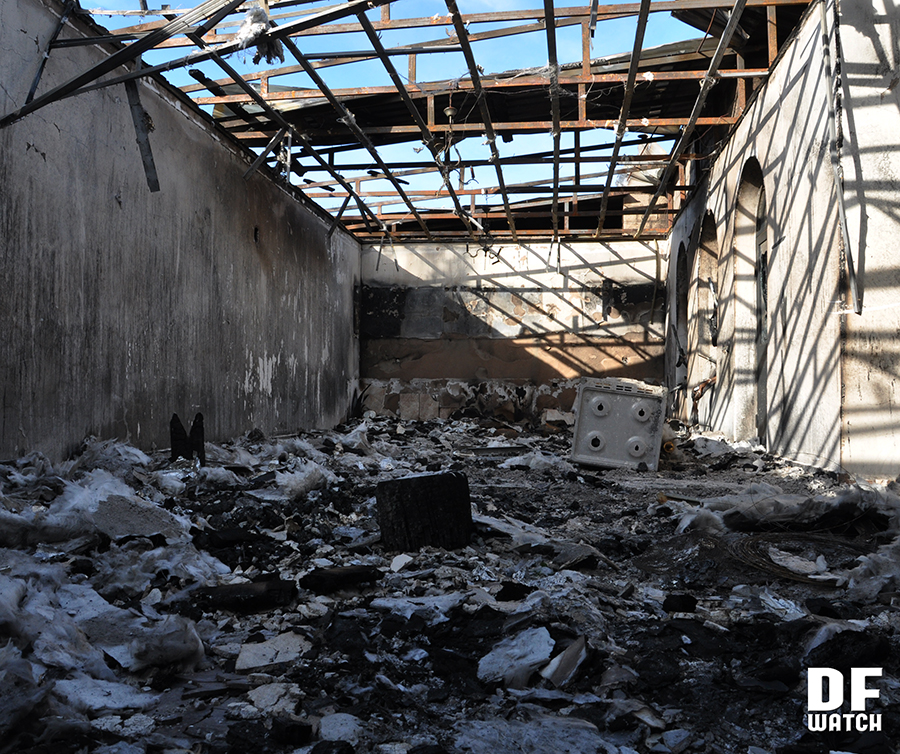
(DF Watch.)
Construction of the temporary prayer house started last summer. When the youth group started going to the new place for prayers, the older group didn’t like it.
“They didn’t like that [the youth] weren’t praying together, by their rules. [That’s] why they turned against [them] and they started spreading rumors,” he told us, adding that they are accused of being Wahhabis.
Khadirov says they know that the youth are not really Wahhabis, a subgroup of Sunni Islam, but they say it to put pressure on them.
“Look at this man, he has no beard, clean face, good boy, decent man. He is no Wahhabi. Our kids are no Wahhabis, they are good and honest children,” he says, pointing to a young man who we also talked to, but who doesn’t want to say his name.
The murder was an excuse for destroying the prayer house, according to Khadirov.
“This conflict existed before, but when the fight took place they had a reason to break in.”
The mosque was burnt down in broad daylight.
He and other members of the youth group filed a complaint against those who put fire to the mosque, according them. They are about 10 people who went to the local police station and filled in the papers and an investigation is now underway, but Khadirov says that if the investigation is unsuccessful they will to go court and demand compensation.
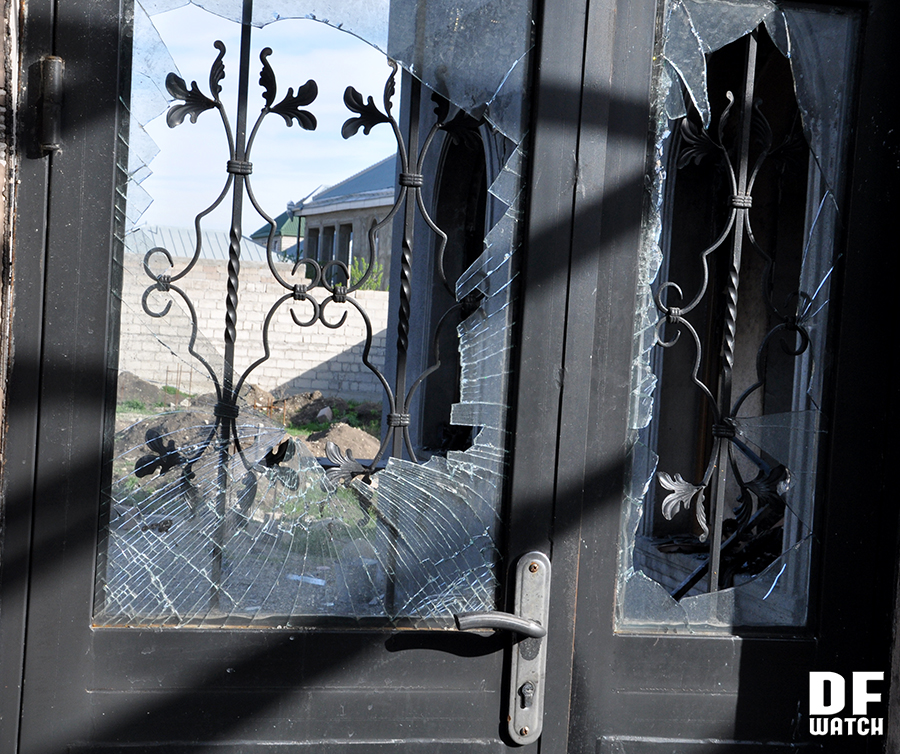
(DF Watch.)
The young ones are not going out for prayers now, as they don’t have a place to go, but one of them told us that the older Muslims threaten them that if they go out they might get beaten.
On Friday, some of them came to the burnt prayer place and prayed on rugs outside in the yard.
The young Muslim who spoke with us named several reasons why they couldn’t stay at the mosque with the others. He said one of the main reasons was that they were practicing self-flagellation. They spilled their own blood in the mosque, which he said is against God.
“We, the young people who started studying Islam, told them that it is not correct to spill blood in a house of God. They didn’t listen to us and finally threw us out,” he said, adding that they got angry for being advised by children what to do and how to pray at the mosque.
He explains that in Islam there is no self-harming. They kept reading quotes from the Quran to the older Muslims.
“Even if you hurt your finger slightly with a needle but on purpose, this is an insult against God,” he continued. “God created humans for beauty, so that they could live good, but they were harming themselves.”
According to Khadirov this ritual has a local background of this area, as their predecessors used to do it. But it is not a common thing to do in their religion, he added.
The young ones also didn’t like when Muslims entered the mosque while drunk or dirty.
We didn’t meet people going for prayer at the mosque; however one Valeri Musaev, one of them, and also a witness of the murder on April 15, spoke with Information Center of Kakheti (ICK), an online newspaper in the Kakheti region.
He says that those who are praying at the mosque think that the youth who go to pray to the new place are Wahhabis. When asked about why the prayer house was burned, he said that villagers were ‘fed up.’
“They said it was enough. A while ago, they beat a child. 60 people came and they beat the child in front of people. On other occasions they have kidnapped engaged girls. When they killed Oruj Amirastanov, people got fed up,” he said. “People went there to not let them gather in that place again. We have one mosque in the village. Everyone who wants to pray must go there.”
Musaev used to be with the young people who were praying separately, but he decided to leave them after eight months, as he didn’t like them, and returned to the mosque. He said they are a group of radicals.
“They call themselves Shia, but I haven’t seen such Shia killing men,” ICK quotes him saying. “It seems they have money and are misleading youngsters. Many young people chose to go with them lately.”
No-one has yet been detained for the murder, nor for setting fire to the prayer house, but there is one suspect in the killing, who is in hiding. There are two separate investigations – one for murder and for damaging private property.

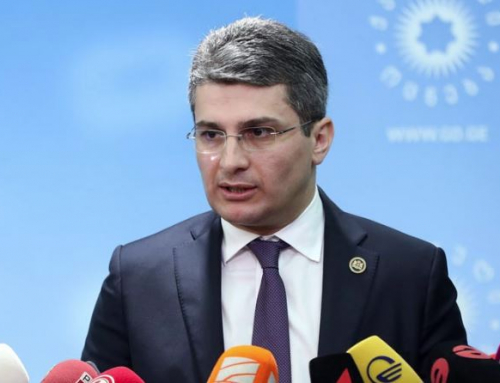



Leave A Comment
You must be logged in to post a comment.